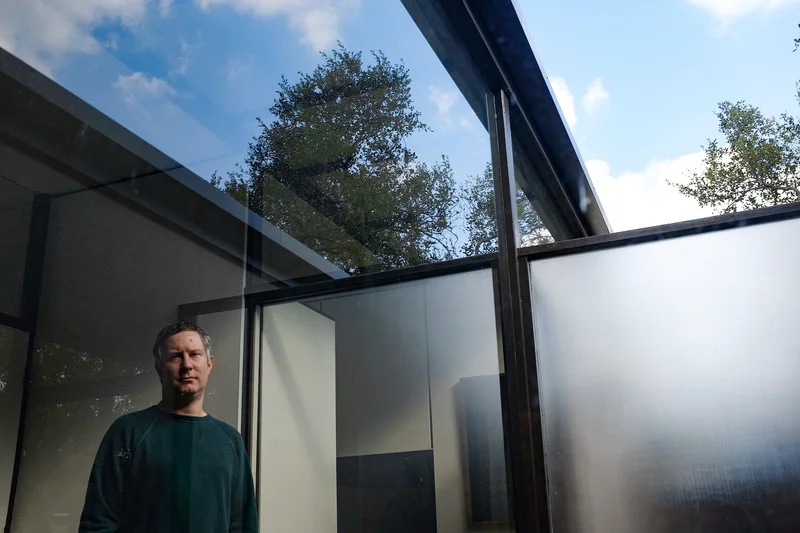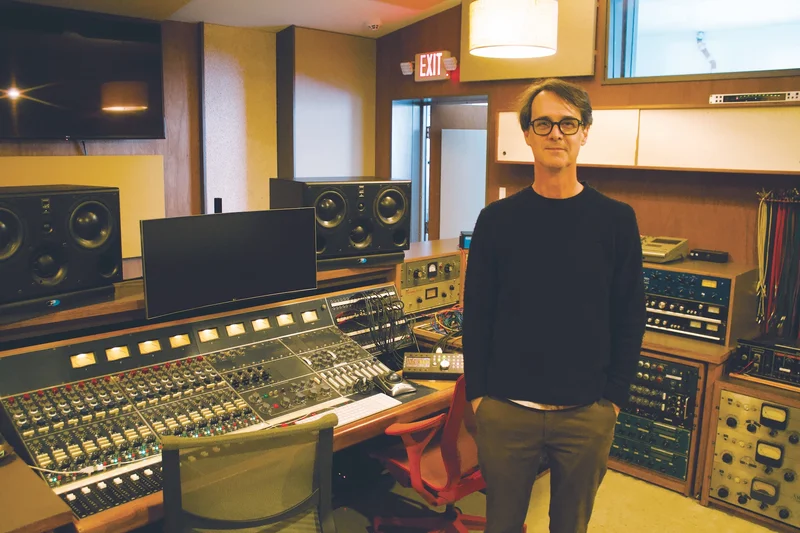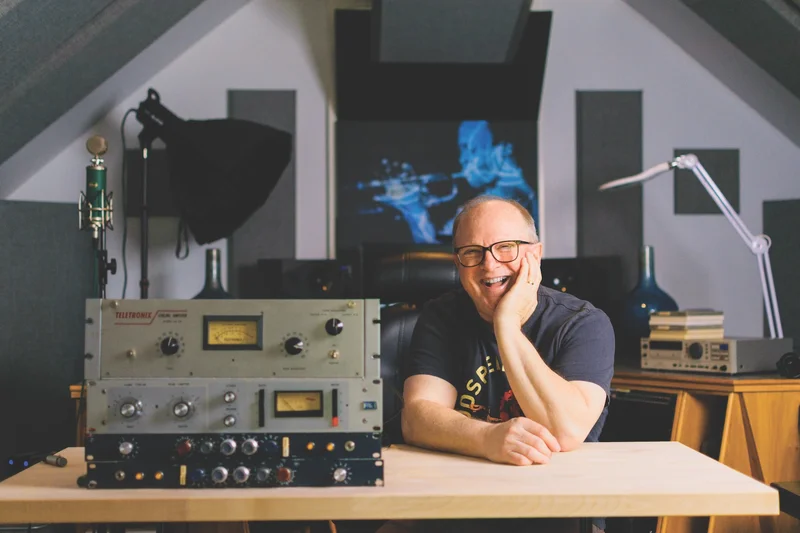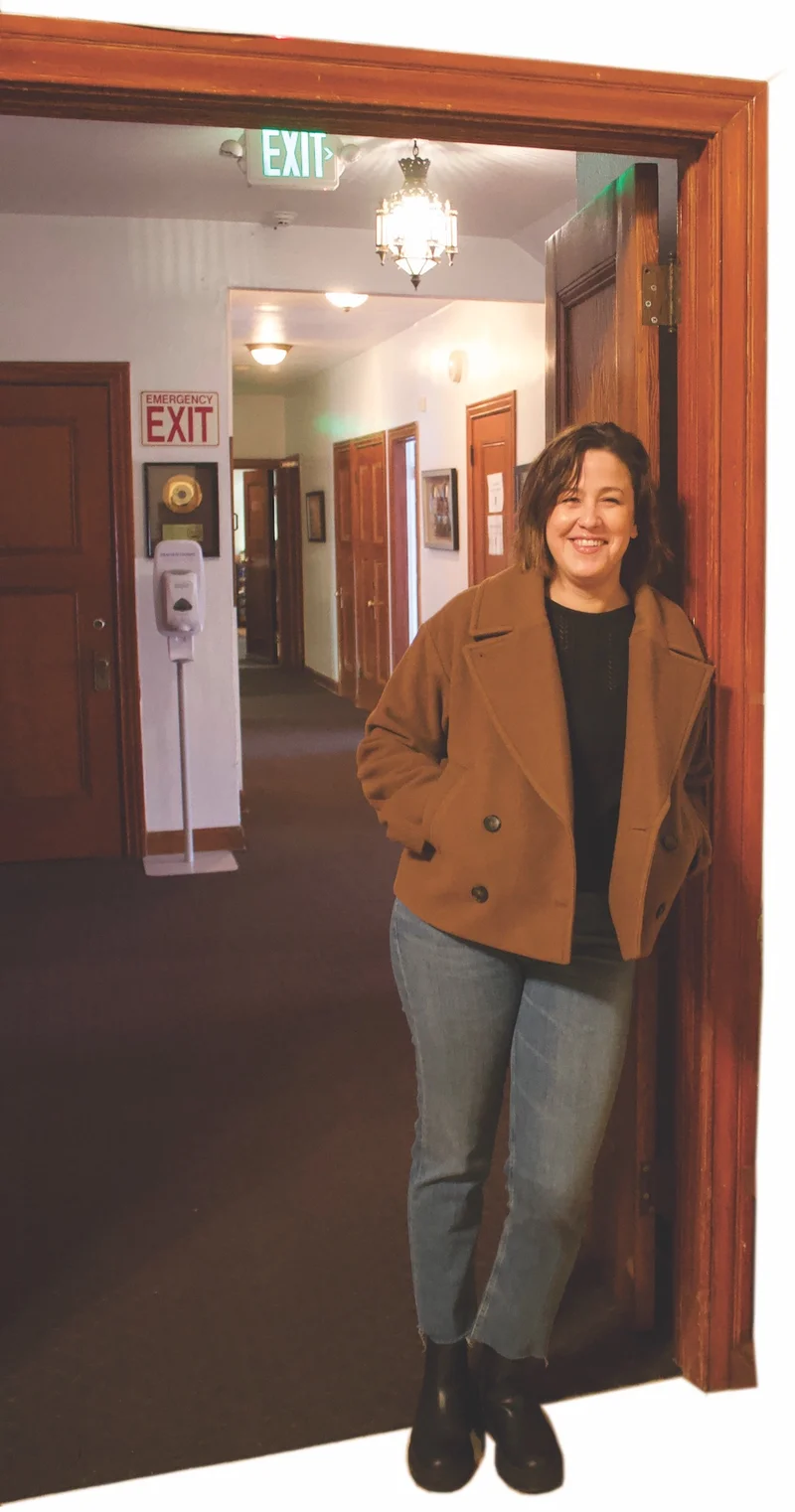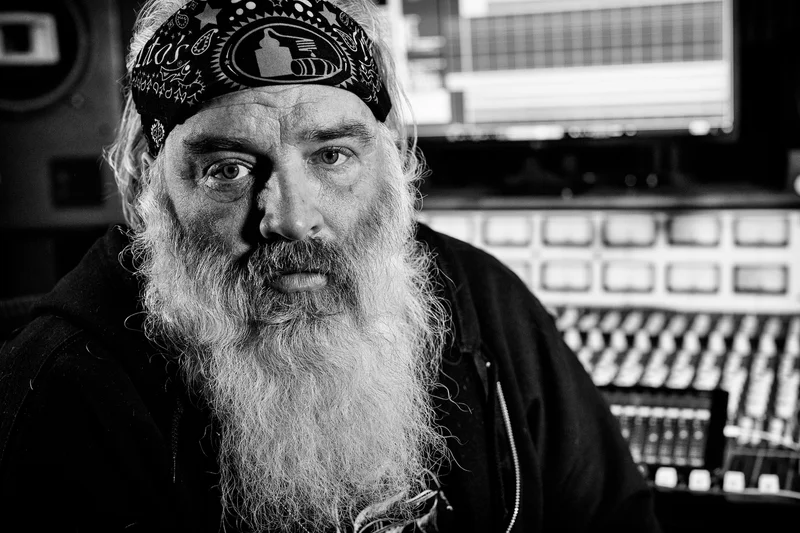You're a composer, multi-instrumentalist, and producer. These are the three main roles that pop up on your credits. Do you identify with one role over any of the others?
I was a musician first, playing in bands, so I think of myself as a musician first. I also love writing ideas with my instruments, so songwriting is probably second. Producer falls in there next. I love getting the arrangements of songs. I love thinking, "This is what the bass is going to do. This is what the guitar's going to do. This is what the keyboard's going to do." And then getting into the sonic mixing of it; like what different frequencies are happening in the track. "Oh, we need a shimmery thing here, and maybe a low end thing there." I guess that falls into the producer category, or at least one of the things that a producer can do.
You mentioned the mixing aspect. Are you hands on when you mix your records, or do you have someone you work with for mixing?
There's a certain point where I started to use outside mixers. When I finish producing a track, I will do the best mix I can possibly do in the amount of time that I have, and I use that as an example of how I want it to sound. Then I hope the mixer will take it to the next level; maybe make it a bit more punchy in the drums, and maybe a little bit bigger or wider. But sometimes my mix ends up getting used. I'll usually mix The Bird and the Bee tracks, and occasionally I will mix a song here and there if people like the rough mix. But a lot of times I'll use different mixers. I've worked with [Mark] "Spike" Stent a lot. I've also worked with Serban Ghenea, Tom Elmhirst, and Manny Marroquin [Tape Op #109]. Those are the main mixers I've worked with.
When someone hires you as a producer, are they getting you as a player as well? Do you end up playing on the records that you produce?
Yeah, unless it's a rock band or something like that. Most of the time, I'm working with an artist; probably a singer. A lot of times I'll play all the instruments on a track. Maybe I'll get a drummer every now and then, or I might get some outside horn player or something. But when it comes to keyboards, guitars, and bass, a lot of times I will play those, and even drums occasionally. I do have some friends who are great drummers, and sometimes it's outside of what I can do on a drum kit. That's the instrument I'd say that I probably play the least.
But you do play? Is that you on The Bird and the Bee?
Yeah, but not all of it though. Joey Waronker is playing on a few of the tracks. On Sia records, or something like that, it's me on drums if it's a live kit. A lot of times it'll be a hybrid of me playing, chopped up, and I'll do some programming with me playing. On a lot of records where I'm playing drums, it's a hybrid.
Do you create loops out of what you've done on drums?

For me, I have to do that. Unless it's a certain kind of song that I can play straight through, really simply. But a lot of times it's more of a pop thing, where I will find the best of myself and chop it up. I wish I could do it straight through, but I'll feel like those four bars are the best. That's going to be the meat of the track, and then I'll fill in some variation from there.
I feel like loops can be more hypnotic and can suck you into the track.
There's something hypnotic about the loop that I probably picked up from early hip-hop, which was some of the music that got me into making tracks in the first place. I feel like there's something really great about a lot of early hip-hop samples, where they loop the intro of the song over and over again. I love that simplicity.
You said earlier that you identify primarily as a musician, but looking back at what you've been doing for the last decade or more, it seems like you're mostly a producer.
Well, that's how I got into production. Production for me was guys like Prince. That's who I used to look up to growing up. I would imagine his productions and how he would build a track with his Linn [drum machine], as well as play the keyboards and all the instruments. That's how I started making tracks, and that's how I got into production. Then later, when I worked with Paul McCartney, the Foo Fighters, and artists like them, I needed to learn another way to produce where I'm not playing all the instruments. I need be on the other side of the glass and help these artists with their vision, and not play all the instruments. Production, for me, is mostly being a musician, and playing, and coming up with the parts, so I do look at it as hand-in-hand.
In 2006, you produced records for Pink, Peaches, Jessica Simpson, and Kylie Minogue. Did that year feel like it was a turning point for you?
Actually, The Bird and the Bee was really the turning point for me. I would say that was really the first time I got to show what I can do. As far as an outside project, beyond The Bird and the Bee, I'd say that Lily Allen was the first record [Alright, Still, 2006] that got noticed. I felt I got to show the more unique side of what I like to do, like referencing older '60s music, bossa nova, Brazilian music, and The Beach Boys. I got to incorporate those elements into pop music. I was free to do that with Lily. That was the first time I felt I got noticed. I started to work in the UK more, and then some of that work started to get noticed in the United States. I'd say that was the start.
So, when you did the first The Bird and the Bee album [self-titled, 2007], was that something you did as a fun, musical project? Or was it like, "I want to make a demo for myself, as a producer."
That was a huge learning experience for me, that first Bird and the Bee album. I really wanted to start to produce tracks and make albums. Meeting Inara was really great, because it was the first time I was able to be self-sufficient, and learn [Apple's] Logic, and do it myself. Before that, I was in bands, or I was a studio musician, and I didn't really know how to record on a computer yet. The Bird and the Bee was the first time I was able to make a full album on my own with a singer. Learning how to mix that record was a big learning experience. I'd never really mixed anything before.
Were you looking to move into production?

I was. I had gotten a publishing deal, but nothing was really happening, except for The Bird and the Bee. We got signed to Blue Note by Bruce Lundvall [former president and CEO of the label]. We put out our first album, and I didn't have much going on, other than some outside production.
Almost ten years later you worked with Adele on her album 25.
That got a lot of attention, and then the Grammys. That was a whole new experience for me. That was really fun. I produced three songs on that album, and we wrote the songs together. I went to England and we did a bunch of writing sessions. In those writing sessions, we ended up doing "Water Under the Bridge," "Million Years Ago," and "Hello," which was the first single. I was producing the tracks simultaneously while we were writing the tracks.
And playing on them?
Yes, I was playing everything on those tracks.
You've got a lot of cool horn arrangements on tracks that you've produced. Do you play some horns?
I don't play any horns, but I used to play a lot of jazz in my twenties. I would play in jazz bands and write jazz tunes; part of that would be writing the horn parts and arrangements. I feel comfortable doing that, and I love it.
Are you actually writing them out with a pencil and staff paper, or are you doing the charts in Logic?
I used to write them out on paper by hand back then. Now I'll do the MIDI, and then the two engineers who work with me – Alex Pasco and Julian Burg; they're great – will print them out. Julian's figured out Logic, so we can print out the pages from the MIDI. We're self-sufficient that way.
Last year you worked with Paul McCartney on Egypt Station. What's it like working with a Beatle?

Working with a Beatle? It's amazing! I get it. I saw what a genius Paul is. Every day I would come in and he'd sit down at the piano and say, "This is a song I feel we should work on." I'd hear these new chord progressions that I'd never heard before. Then he'd play the bass, and those bass lines are incredible. He's the greatest bass player, for me. Everything is very complex, what he's doing. He thinks he's just a rock 'n' roll guy from Liverpool, but he's so much more. There's so much complexity to the harmonies that he comes with; the chord structures, melodies, and everything are so amazing. He comes up with new ones all the time. I don't hear him repeating himself – even production ideas. I think he really likes to always move forward and not do something ordinary. He always wants to push the envelope. I think if he works with the right person, that person will help him do that as well. I really wanted to be that guy for him. Instead of the typical "band comes in and plays a song," he wanted to use a cello, or he'd do that on a guitar part. Maybe we'd have his harmonium doing that, and a flute will play this part – something that's not the obvious. I love that he wants to do that, and he always pushes that boundary.
Were you playing much on that record, or was it mostly Paul?
Occasionally I played parts. Keyboard is my number one instrument. Sometimes I'd say, "How about this, Paul?" I'd go out there and play something, and he'd say, "That sounds great! Just play that." Or there'd be a Minimoog bass part; I'd hear something and present him with it. If he liked it, I'd play it. But he played a lot of the instruments on the record, and his band also came in. Abe Laboriel Jr. played drums a lot on the record, and sometimes Paul would play. I love hearing Paul play drums, guitar, and piano. He's great.
Was most of it more built up rather than tracked as a band?
It was a variety. The majority of it was built up. It would be the two of us in the room adding parts and trying to solve the equation of, "What does this track need?" I was trying to feel out what Paul was needing at that moment. He'd always come into the studio with a plan for what he wanted to do each day. Sometimes he would have a clear vision of how to achieve that, and sometimes he would look at me and ask, "How do you think I should achieve this?" Then I would chime in, and I would start coming up with ideas. There would be days where he wanted to bring the band in for a week, so we would cut it live, which was really fun. I think Paul really enjoyed that. He likes to mix it up and keep it interesting.
How long did you guys spend on Egypt Station?
It was off and on around his touring schedule. He's always got something going on, so we would fit in a couple weeks here and there. I think it was a couple of years, off and on. If you were to add it up, it would probably be about four or five months.
Are you doing more records that way now, where it's spread out over a year or two?
Yeah. I'd say a lot of records are done like that because the artists are working with multiple producers. I might be doing half of an album, and then they'd go work with someone else and I would jump to another project. When I work with someone like Foo Fighters, it's concentrated in a short amount of time. Whereas The Bird and the Bee sessions are very spread out. We're chipping away at it because we've both got other things going on. A lot of sessions are spread out.
Do you like bouncing around constantly?

I do, actually. It gives it a very fun and interesting feel. Do a little bit of this, and then jump to something else. I get perspective and learn from new projects. I can take a little bit of what I learn, and when I revisit an older session I've been working on, I can bring some of that into the new project. Then I can see how this compares to everything I've been working on.
How was it working on Beck's Colors?
I love working with Beck. I play a lot on that record, and Beck jumps in there occasionally and plays a guitar or a keyboard part. I have a lot of respect for his ideas when he plays. He thinks differently than I do, but we also overlap. He's such an easy guy to work with. He's very free and doesn't mind exploring the most ridiculous idea – we'll narrow it down to something that we feel comfortable that we can put out. He's such a creative guy, harmonically. He comes up with such great chords, as well as interesting melodies and harmonies. Very '60s, like The Byrds. He's really good at that, or these Beach Boys countermelodies. At the end he'll do the vocals, and then he'll start throwing in these harmonies. That's great, and it really turns into a Beck track.
I had read that that album was spread out over several years as well.
Yeah, it was similar to the Paul McCartney album, where we were going to get together for a couple of weeks and work on it. He would go off and tour, and I'd start working on other records. We were both pretty busy. I was producing a lot of different records, and Beck is always busy. It took a long time to figure out what the record was. We got serious at the end, "Okay, these are the songs. Let's finish these up."
Do you get to a point sometimes where it's like, "I need to get this one out of my life! We need to get it done."
It's easy when you've worked on something so much to lose perspective, but I knew down deep that that record, specifically, I was really proud of. It was something I was not doing anywhere else, or with any other music. It really straddles all the music I grew up listening to, but also pop music. I felt very excited about the music, even though I might have heard the songs a million times when working on them. I still could remind myself, "This is going to be great."
You've done five records with Pink. How do you keep the musical relationship fresh? What makes people want to keep working with you again in an industry often in search of the newest flavor and hippest new producer?
I have to go in there and not have any expectations that what we did before is going to work this time. I have to really be careful about that. People go through changes, I'm going through changes, and I find that you can never repeat what you did. I'm always trying to make it feel like it's the first time we've worked together, and not get too comfortable. I think that's really important. I try to be open-minded and be a good listener. Maybe that's why people come back to me. Hopefully they feel they're getting good work, but I'm really hard on myself. I want to do a good job, always, so I try not to get too comfortable.
You straddle different sides of the music industry. You're doing highly commercial-orientated records with Adele and Pink, and then working with Beck and The Flaming Lips.
Yeah, it's funny. I started out more in the indie rock world in the '90s; that's where I started playing in bands. Then, in the early 2000s, I wanted to be a producer who builds tracks and the only place you could really do that at the time was the pop world, so I jumped into the pop world. A lot of my friends who were playing in bands in the indie rock world were laughing. Like, "That's funny. Greg's working with this or that artist!" It seemed a little bit out of place for me. But all of a sudden everything merged, and artists like The Shins and Beck were looking for someone outside of the indie rock world to work with. I played with Beck's band in the early 2000s, then I left, and then we came back around and worked together again. He wanted to do something a little bit more pop. It's funny how it came back to that world. I felt comfortable in the indie rock world because of that. Now, who knows what is what? It's hard for me to decipher if the tracks for pop music are the same as the tracks for indie rock music. I don't know!
The barriers are going down a little bit.
Yeah. It's really about the songwriting, the voice, or the lyrics that differentiate it. Everybody's working on pop music now. It's a whole different thing, and it's great.
The Liam Gallagher records you did must have been fun to work on.
That was fun. I worked with my old buddy, Andrew Wyatt [Blakemore], on that. We played in a band together in college, so it's fun to work with him again. Liam was great, super straightforward, and he knows what he likes. I got to rock out more, which was really fun. He was into what I was doing, and I was really proud of what we did on that first album [As You Were]. I did a few on the new one [Why Me? Why Not.]. I don't really get to do stuff like that too often. It's nice to branch out; it's definitely part of who I am, and a far cry from some of the music I've put out. I grew up playing in rock 'n' roll bands, so it's nice to have these opportunities to do that with different people.
You said you were into rock more when you were younger. That should be pretty obvious with the new Bird and the Bee album, Interpreting the Masters, Vol 2: A Tribute to Van Halen.
We took the rock out of it. When Van Halen came out, that was the biggest band in the world to me. It was the first music I got into when I started playing in bands. Van Halen, Ozzy, and Rush. That lasted for a short time, and then I got into punk and The Clash. I stopped listening to the hard rock bands and got more into punk and new wave music. But 11-year-old me was all about Van Halen. That was as big as you could get.
I love what you guys did with it.
It was really fun to tackle that music and turn it into The Bird and the Bee music.
Where were you when you first heard their debut album, Van Halen?
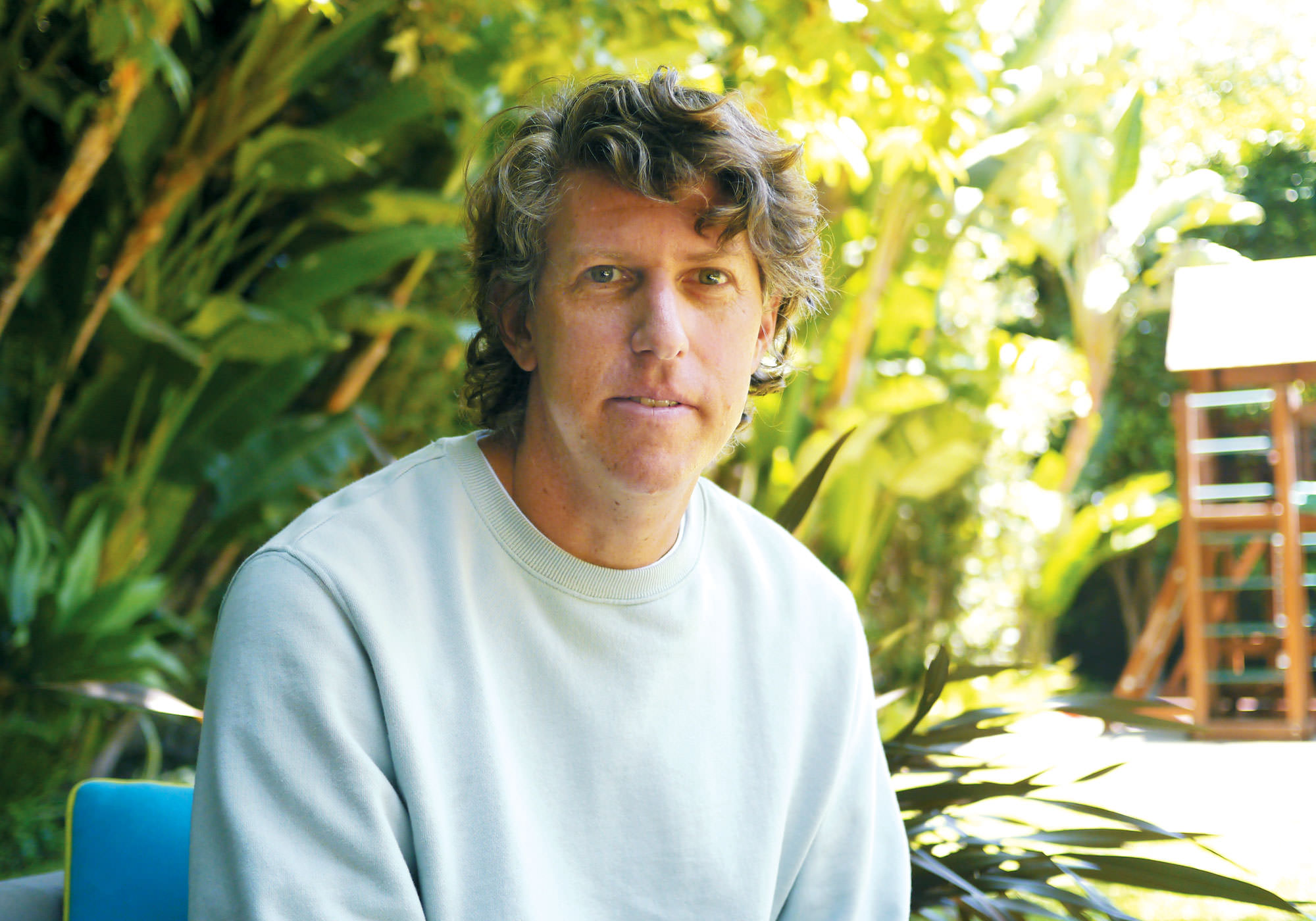
I was probably in a car somewhere. Maybe a day camp. I bought the vinyl; I still have the same album. It's all scratched up. I think I heard "You Really Got Me" and "Eruption" first. It still sounds huge. When I was working on The Bird and the Bee versions, I would use the sonics as an educational thing. In Logic you have the Match EQ plug-in. I was wondering, "What's going on in that guitar tone?" I noticed there's so much low end to the guitar on that record; the guitar fills so much space. I Match EQ'd it to my [Sequential Circuits] Prophet-5 [synthesizer] going through an amp to see if I could Match EQ the Prophet-5 to his guitar tone – I wanted to see what the difference was. All this low end got boosted by the Match EQ. Then I have that EMT digital plate panned to the right, guitars on the left. I used a little bit of that. Isn't it that digital EMT? That record's drowned in reverb.
It sounds huge. It also has a lot of space, because there's not that much going on. Drums, bass, and maybe two guitars.
The drums sound massive. Drums and guitar take up a lot of space; but then, when he takes a solo, all the rhythm guitar drops out and it still sounds full. I tried to keep that feeling on The Bird and the Bee record. There are a lot of layers to the record, but there were times when I wanted to keep it keyboards, bass, and drums. When the keyboard's soloing, maybe not have any other keyboards under it. I wanted to keep a little bit of that tradition going on.
Which keyboard is the main synth on "Ain't Talkin' 'Bout Love"? Do you remember?
Definitely the Minimoog.
There's a polyphonic synth, too.
It might have been the [Roland] Juno-60, [Korg] Polysix, or the Prophet-5; those were the main ones. There's probably a little [Yamaha] CS-80. There was [Roland] Space Echo on some of the long, held-out notes. I think I flanged the drums. We did some real tape flanging. My engineer, Alex Pasco, ran the drums through a tape machine, did some VSOing [Variable Speed Oscillator], and got a real flange like The Cars did. That was fun. That one was Joey Waronker on drums, and Justin Meldal-Johnsen [Tape Op #93] played bass on that. We cut that mostly live. The Prophet-5 is some of the lead on there, played through an amp. That was a fun one.
You don't see too many CS-80 synths working anymore.
This one is working great. It's an incredibly deep synth, and I do use it quite a bit. I like that you can make your own presets. I do a lot of the Blade Runner trick, where I hold out a note and let the frequency open up a little bit. I get a little vibrato and it bends with the aftertouch, using it as a lead synth. I know Bruce Springsteen used it in a polyphonic way on "Born in the U.S.A." It's a cool instrument.
Michael Anthony never overplayed the bass parts in Van Halen.

There's definitely a lot going on with the drums and the guitar. Eddie Van Halen's rhythm playing is incredible. I think that's one of the things that people don't mention enough.
The riffs are what make that record.
Yeah, and the solos are so fluid, like [Jimi] Hendrix. Then David Lee Roth; you can't mess with those vocals. He really has an incredible phrasing. There's no one like him.
Did you have to pull back on your bass playing in order not to get too complicated?
Well, I did what I wanted. There's some bass on the record, but there's also a lot of keyboard bass. I took it a little bit into the world of Devo or The Cars. Those were some of the references I was thinking of: that angular new wave realm, which is another area of music that I really love. I thought, "What if I bring a little bit of Devo to Van Halen?"
He's got such a great voice. It's so unique.
Yeah, definitely. When you have a vocalist like that, it makes my job easy. They go and sing and deliver. "Oh, okay. My job is done." It's a nice thing.
When you're working with a vocalist, do you find yourself coaching them? Or do you let the singer decide what's a good take?
I tend to let the singer decide, but I've been really lucky that I've mostly worked with great singers who have a personality. When I've worked with singers who have trouble singing, sometimes it's hard for me to know what to tell them. I could get technical with them, but I'm really a vocal producer who lets the vocalist do their thing. I try to make them feel comfortable. I try to take any pressure off so that they know they can do as many takes as they want. I don't make them do a million takes. We can do a few takes to get that initial energy. "Let's do a few takes, and we can always come back to it later if you feel we didn't get it." If they want my feedback, I will give it to them. Certainly I'll say, "I like when you did that" or, "Maybe if you could hold that note a little bit longer?" But I don't really get into "relax your diaphragm." I don't really know the technique of it. I do love harmonies and vocal arrangements. I can really get in there when it comes to that. I have ideas for days. I can almost be annoying, like, "Can we do one more harmony?" I love coming up with countermelodies and harmonies. That's where I really step in there with a lot of singers.
You've spent the last ten years working with some huge pop stars. Do you ever get intimidated? How do you manage the egos in the room, or does it melt away once you get down to working?
Everything melts away. When you get in the room with anybody for the first time, there's a little bit of nerves. I want to be liked and to do a good job. Growing up, I was more nervous outside of music. Music was my sanctuary where I could feel at home and comfortable. I never want that to get in the way. When I'm making music, I remind myself that this is where I get to feel good and shine. That's why I play music in the first place. Everywhere else, I was awkward. I don't let the nerves get in the way. I'm getting in a room with a human being and I try to treat them like a person. "How's your day? What did you do today?" We're all the same. I can easily jump into that and get comfortable with somebody, even though they might be a famous person. Even Paul McCartney. You can get nervous with a Beatle, but I realized I feel comfortable in my ability. I've worked really hard in music, and I feel I can do what he wants me to do. If he wants me to arrange vocals or help him harmonize, I feel very comfortable in that world.
So, music is your happy place?
Music has always been my happy place. I didn't ever want to let anything get in the way of that. I feel like this is the area I'm supposed to have fun, and I always want to remind myself of that.

